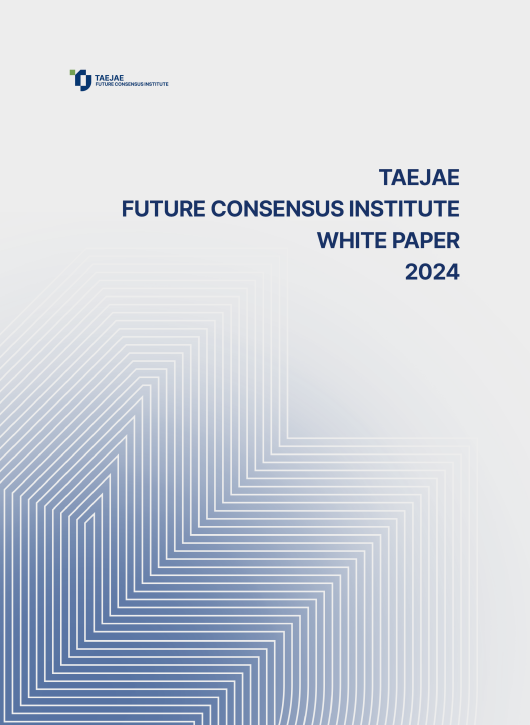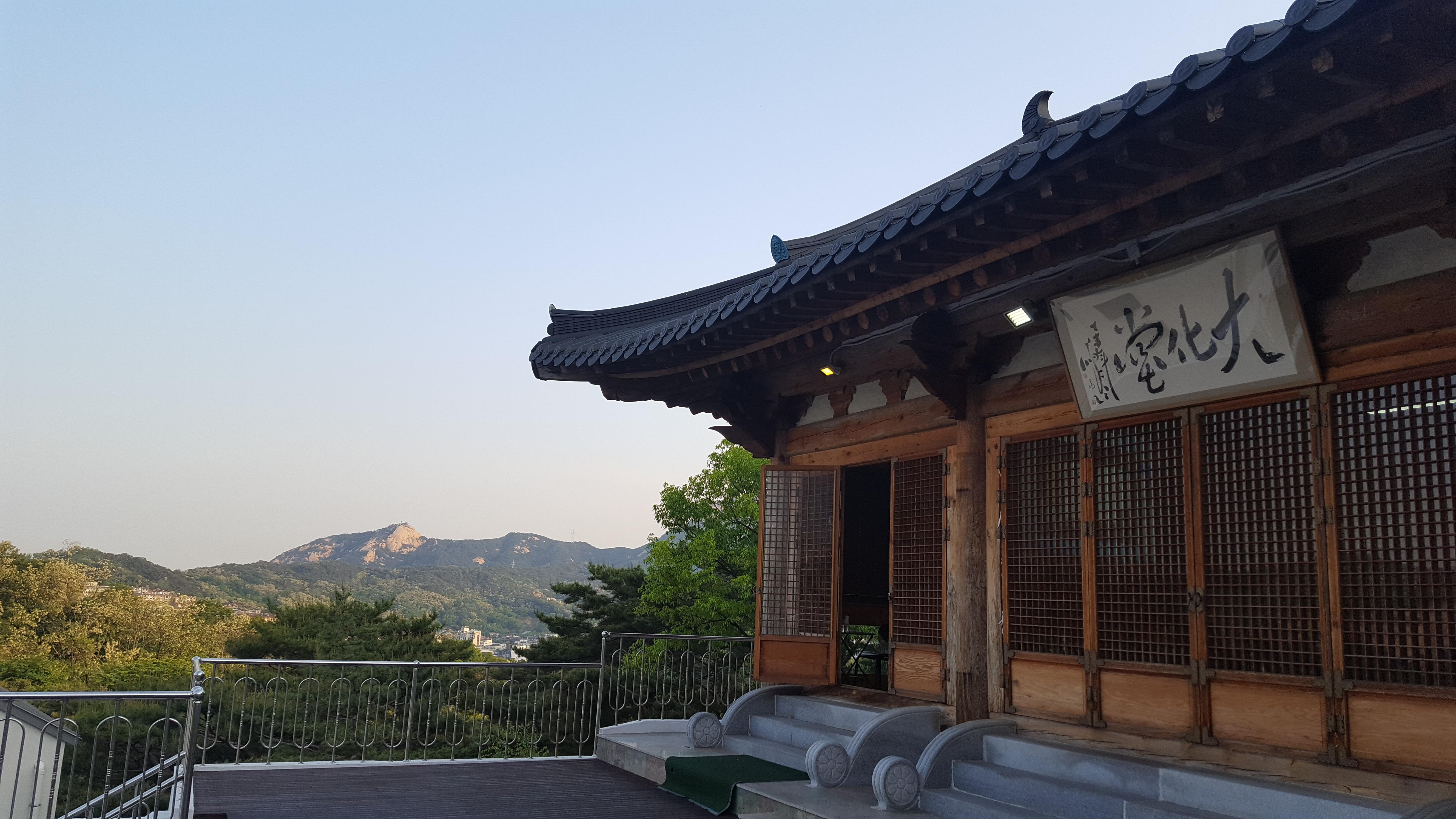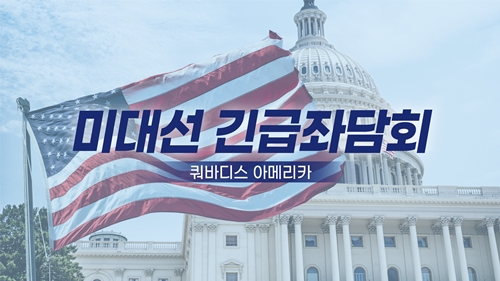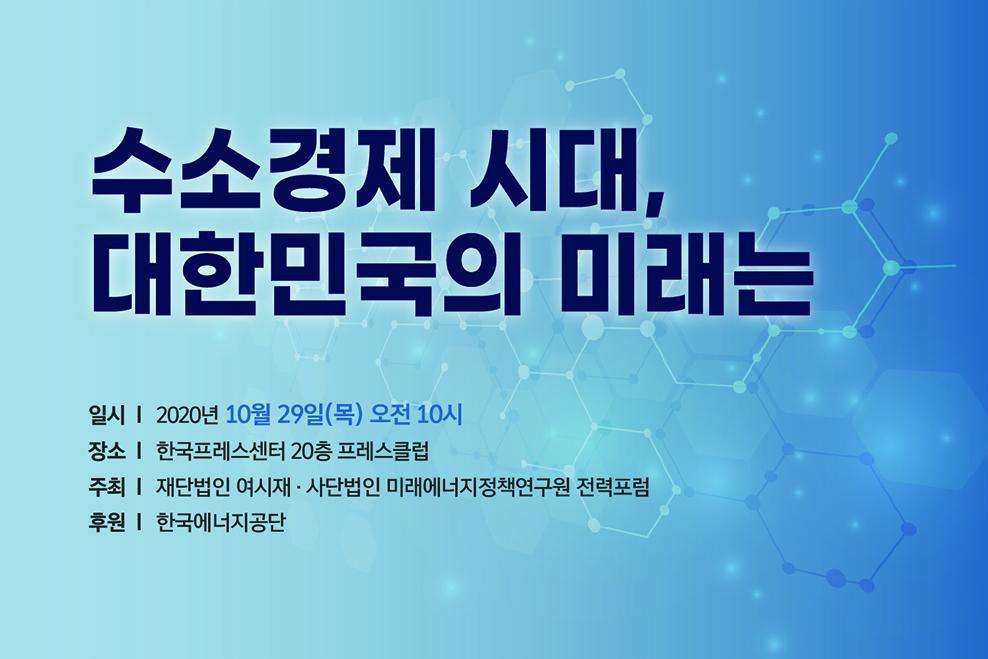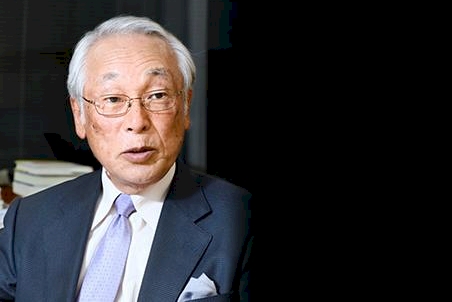Please join Yeosijae as we build a brighter future for Korea. Create your account to participate various events organized by Yeosijae.
[Outlook 2021 ② / EAI Chairman Young-Sun Ha] “Rebuilding world order… South Korea should become the ‘link’ between ‘great’ and ‘small’ powers.”
- South Korea needs to be actively involved in the process of developing a new international order to secure its position in the new world
- Four major foreign policy challenges facing South Korea: U.S.-China relations, South Korea-North Korea relations, South Korea-Japan relations, and post-COVID world order
- South Korea should focus on trust diplomacy to better its position in the U.S.-China rivalry
A fresh new year is upon us, with the coronavirus still running rampant throughout the world. Although the vaccines are here, international cooperation for swift, equitable deployment is nonexistent, and with nationalism more prevalent than ever, countries have been forced to struggle on their own. The political landscape ahead of South Korea is as challenging as ever, and the unprecedented times of COVID-19 push us to be more vigilant and more analytical than ever. Against this backdrop, the Future Consensus Institute (Yeosijae) spoke with Korean, American, Chinese, and Japanese scholars to understand the challenges surrounding the Korean Peninsula and predict the future ahead of us.
In this second interview of the Outlook 2021 series, we spoke with Chairman Young-Sun Ha of the East Asia Institute (EAI) to discuss the future of U.S.-China relations and the Korean Peninsula. During the interview, Chairman Ha said, “we will be rebuilding order in the international society, and South Korea has to become a ‘link’ that connects ‘great’ powers with ‘small’ powers in this new world.” Chairman Ha is a renowned political scientist who has taught Political Science and International Relations at Seoul National University for 33 years and has published over 20 books.
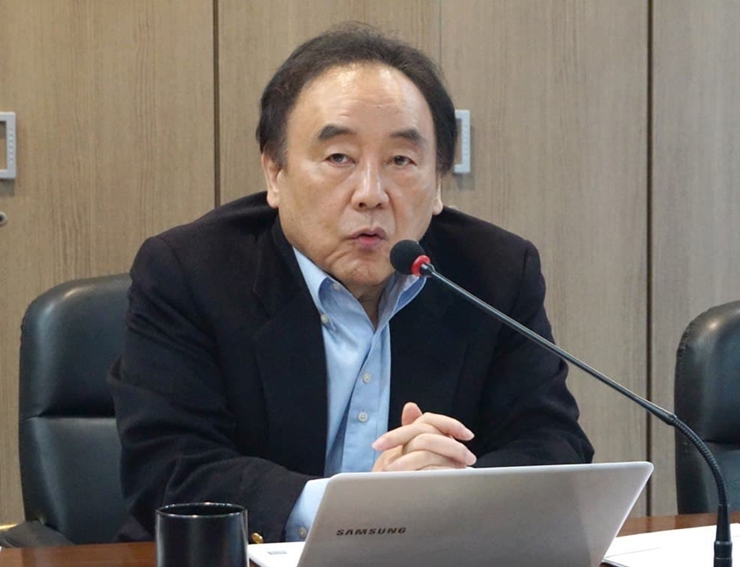
“Rebuilding” a new global order:
The rebuilding process will determine the winners and losers of the global recovery race
Q. What keyword would best describe South Korea’s foreign policy in 2021?
A. “Rebuilding” is the word I would use to describe 2021, but not in the sense of buildings and structures.
The biggest challenges of 2021 will undoubtedly be COVID-19 and U.S. China relations. And let me begin by comparing COVID-19 responses with a 400-meter race. Our initial response to the coronavirus outbreak was our first 100 meters. South Korea fared quite well during this part of the race, thanks to its relative success in handling the crisis, but it was too early to pop the champagne. Vaccines and treatments were—or are—the second part of the race, the part we are in now. After a slow start in responding to the pandemic, the U.S. has made headways and has found itself at the front of the race. South Korea, on the other hand, has started to fall behind others. Up ahead, for our third section of the race, we have the post-COVID-19 economic recovery, where the U.S., China, Asia, and Europe will engage in a fierce competition to come out on top. But the most important part of the race is the home stretch, the final showdown on who will lead the new world order in the post-COVID-19 world and cross the finish line first. At present, neither the U.S. nor China have started their preparations for this part of the race. South Korea is yet to even recognize the existence of this final stretch of the road. Nonetheless, we must remember that the last leg of the race will hinge on the “rebuilding” of world order.
This brings me to our second challenge of 2021—the U.S.-China relations. As President, Joe Biden will review Trump’s foreign policy and develop a new foreign policy of his own. Of the changes expected, we will have to especially focus on the future of U.S. policy towards China for its massive influence on South Korea. Although the Biden administration may not completely overhaul things, there will be many “rebuilding” in 2021 that follow the blueprints that they have laid out.
With the introduction of Biden’s China policy and the dawn of the post-COVID-19 world, we will have two “rebuilding” issues at our hands in 2021. If we overlook the importance of “rebuilding” and fail to make preparations in advance, we will run into many problems in the future. Consequently, South Korea will have to get actively involved in the “rebuilding” process from the early stages of development to secure its position in the new order.
Q. “Rebuilding” was the keyword you used to describe South Korea’s foreign policy in 2021, and it seems to follow the same line of thought as Biden and his slogan of “Build Back Better.” American political scientist Graham Allison has also recently highlighted “restoration” as one of the main pillars of Biden’s foreign policy. What are your thoughts on “restoration,” and do you think it is the only solution available to America right now?
A. The keyword, or the key phrase, that best describes Biden’s policies is “restoring American leadership” – the name of his transition website. With Biden, Trump’s slogan of “America First” was changed to “Restoring American Leadership,” and their biggest difference comes from the idea that America will stop acting alone. Biden’s new slogan sets a better direction for America than the “America First” policy, in that it aims to build a new order with allies and other countries that share its values, but it is not the best policy direction. To “restore” something means you will “return” that something to a “former” state. The U.S. demonstrated global leadership in the decades after the Second World War because it was unmatched in terms of power. However, things are different today, and the U.S. has to present a new global leadership while it is weakening in power. What the U.S. needs right now is not a return to the past but a brand new, future-oriented leadership.
Leadership in the post-COVID world:
Rebuilding for cooperation and symbiosis
Q. Could you elaborate on this “new” leadership?
A. Globalization, powered by neoliberalism of the post-Cold War era, had its benefits, but it did not lay the foundations for an environment where life on earth could coexist. President Trump’s populist solution of “de-globalization” has also failed, as it can be seen in the circumstances today. When all is said and done, what the world needs today is comprehensive “rebuilding” of the old order through “re-globalization.” First, we need inclusive leadership, not self-serving leadership, that embraces and supports all players. Second, we need attention to the growing complexity of global stage. Today, it deals with not only the traditional priorities of national prosperity and defense but also emerging issues like ecology, culture, and technology. Consequently, leadership in the post-COVID era should not only facilitate cooperation in the traditional areas of competition and conflict (military and economy) but should also simultaneously seek symbiosis in the areas of ecology and technology. If the U.S. wants to turn the COVID-19 crisis into an opportunity for American leadership, I think there is no better time to act than now. The America-centered liberal world order that emerged after the Cold War did not deliver the results that were expected, and over the last three decades, its shortfalls have been manifested in the forms of terror, regional conflict, global financial crisis, U.S.-China conflict, and a worldwide pandemic. So, instead of “restoring American leadership,” the U.S. should present a new, future-oriented leadership to the world—one that can embrace not only those who share America’s values but also those who do not, like China. Moreover, it should combine the traditional areas of competition, conflict, and cooperation (military and economy) with the areas of symbiosis (culture, ecology and technology) for the future-oriented world order. In particular, as a leading country in vaccine development, the U.S. should spearhead advancements in the ecology and technology fronts to help the world fight the coronavirus.
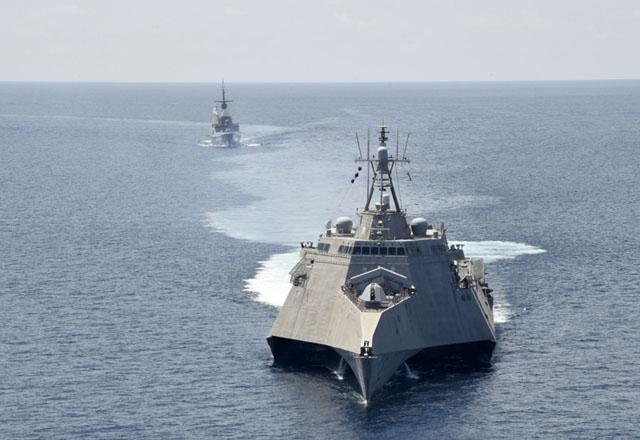
through the Pacific Deterrence Initiative (PDI). The photo above shows USS Gabrielle Giffords.
(Source: United States Indo-Pacific Command)
“The Power of Example”
Biden will restore trust in America’s sense of purpose through democracy
Q. What will the U.S.-China relationship look like in the Biden era?
A. Biden’s foreign policy can be summarized in two main pillars. The first, reflecting his promise to work with allies again, is “restoring American leadership.” His foreign policy, as previously mentioned, is different from Trump’s “America First” policy. The second pillar is the emphasis on democratic values and the “power of example.” We have to note his choice of words when he states that he will lead “not by the example of power but by the power of example” – a phrase he has long used and has recently highlighted on many occasions. Unlike the former, which only highlights hard power, the latter indicates that Biden perceives the values and norms of democracy to be the most important aspects of power and that he will not only emphasize America’s hard power—through military, economy, and technology—but also its sense of purpose with democracy. In short, these two principles will guide Biden’s foreign policy and shape the U.S.-China dynamics in 2021.
One thing that we should note as Biden puts forth his foreign policy under these two principles is the continuity of the Trump administration’s “Indo-Pacific” concept. Used by the Trump administration to replace the term “Asia-Pacific,” “Indo-Pacific” began as a “value” concept that gradually expanded to become a new economic and strategic frame of reference. The Biden administration will further develop strategically and financially Trump’s “Indo-Pacific Initiative.” And like his predecessor, Biden’s foreign policy will center around China. However, there will be changes since Biden’s principles differ from Trump’s. Under the first principle, “America Alone” will no longer apply, and the U.S. will work with its allies to push its China policy forward. Moreover, under its second principle, the new administration will emphasize values just as much as the economy, technology, and military.
U.S.-China Rivalry:
U.S.-China competition spans across the economy, technology, values, and military fronts
Q. Do you think there is a chance for U.S.-China relations to improve in the future? There are concerns that the U.S.-China conflict could escalate into a military confrontation. What are your thoughts on this matter?
A. The tensions between the U.S. and China are not limited to the issues of security and economy. A part of their battle is on the economic front—in the fields of investment, trade, and finance—connected to a battle on the technological front, which has great influence over the tides of war on the economic front. Values and military fronts have also become relevant in their relationship in the 21st Century. All in all, it is a complex, intricate scene, and though Biden will continue to keep a close eye on the economic and technological fronts, values—which deals with democracy— will gain significance in the new era. With Biden having a more balanced approach to foreign policy, the U.S.-China relations should not deteriorate as quickly as it did with Trump. Instead, it should gradually get better or worse.
So the chances of U.S.-China rivalry slipping into military conflict is much lower with Biden. And Minister of Foreign Affairs Wang Yi gave two interesting speeches last December. During the “Symposium on the International Situation and China’s Foreign Relations in 2020” on December 11, 2020, he outlined China’s seven foreign policy objectives in 2021, and during the American Society videoconference held on December 18, he described China’s stance on the U.S.-China relations. The key takeaway from the speeches is that China’s number one priority is the economy. The year 2021 marks the 100th anniversary of the Chinese Communist Party (CCP) and prepares the country for its next milestone in 2049—the 100th anniversary of the founding of the People’s Republic of China. It also marks the start of China’s 14th Five Year Plan, so it comes with no surprise that China’s top priority for 2021 is the international and domestic economy. Its second priority is building a “new type of international relations,” composed of “great power relations”, which centers around U.S.-China relations, and “neighborhood relations” with neighboring countries. Beijing has expressed that for U.S.-China relations in 2021, it first wants to reaffirm the three principles of “non-conflict/non-confrontation, mutual respect, and win-win cooperation” then subsequently resume talks, rebuild trust, and work together to address pressing matters like the COVID-19 pandemic, economic recovery, and climate change. But at the same time, it has noted that it will take necessary measures against any unjustified “interference” in China’s core interests such as internal, external, and economic security.
This does not mean, however, that the new U.S. administration will be particularly aggressive with Beijing and that China will take a softer stance on Washington. China is well-aware that its military capacity pales in comparison to those of America’s. Accounting for roughly 40% of world military spending, the U.S. is a military superpower that spends over $700 billion a year on the military. This is almost three times the amount of China’s annual defense spending— roughly $260 billion. On a cautious outlook by military experts, China’s military spending is expected to reach the levels of the U.S. around the year 2050. So it is unrealistic to say that China could butt heads with the U.S. on military terms. However, if China sees that its core interests are being unfairly constrained or undermined, it could resort to military actions that do not involve any direct confrontation with the U.S. to use it as a diplomatic tool.
Korean Peninsula and Inter-Korean Relations:
Multilateral negotiations like six-party talks will become important again
Q. Let’s move on to a question about the Korean Peninsula. What are your thoughts on the future of inter-Korean relations and U.S.-North Korea relations in this increasingly complex global environment?
A. The first order of business for Biden is COVID-19 and U.S.-China relations, so the North Korea problem is a relatively low priority for the new president. Nevertheless, Biden’s North Korea policy will be different from Trump’s in at least four ways.
First, there will be no “top-down” diplomacy. During the presidential campaign, Biden made it clear that he will part with Trump’s one-sided top-down diplomacy and made-for-TV summits. Consequently, he will place more weight on bottom-up diplomacy. Second, the new president will try to work with other stakeholders. Just as he plans to handle the U.S.-China relations with other countries that share U.S.’ values, Biden will tackle the North Korea problem with bottom-up diplomacy that involves other stakeholders. Multilateral negotiations like the six-party talks will become important again as a result.
Third, Biden will first negotiate a “nuclear freeze” with North Korea, although denuclearization will continue to be the ultimate goal of the negotiations. His team, however, will not engage in negotiations without any guarantees for denuclearization. So negotiations will resume only when North Korea demonstrates its commitment to complete denuclearization by disclosing a comprehensive inventory of its nuclear facilities and arsenal. North Korean leader Kim Jong-Un has been open to the idea of partial denuclearization, but he has never made the strategic decision to reduce the country’s nuclear capacity beyond the extent needed to ensure the security of the regime, and he will not give up on it so easily. The U.S. wants North Korea to provide, at the very least, full nuclear disclosure and access for verification. So there will be a fierce battle on the negotiating table for sanctions relief and security guarantees by North Korea and for a nuclear freeze and comprehensive report and verification of nuclear facilities and nuclear materials by the U.S.
Lastly, the Biden administration will expect North Korea to initiate actions that lead to the final decisions needed to move denuclearization forward. In evolutionary biology, we call this “self-produced” effort, and for this to happen, communication of information is critical. Controls on information and communication in North Korea, as a result, will subsequently assume greater importance in our relations.
Q. If the Biden administration is poised to work with other stakeholders in dealing with the North Korea issue, does that offer an optimistic outlook for South Korea?
A. There are some aspects of Biden’s second principle (or democracy) that will come into conflict with the Moon administration’s North Korea policy. The ban on anti-North Korea leaflets, for example, was deemed “necessary” by the South Korean government and the ruling party as a confidence-building measure. They argue that negotiations will be difficult unless they build trust with North Korea by listening to their demands on the ban on the launching of propaganda leaflets that threatens the regime’s security. However, communication of information is necessary from U.S. perspectives because information is key to North Korea’s “self-produced” efforts to move from authoritarianism to democracy – a drive that is needed to achieve complete denuclearization. America’s focus, even on the issue of anti-North Korea leaflet drops, is on the symbolic meaning of the regime’s efforts to block the flow of information into the country.
The Moon and Biden administrations will have some differences in their priorities of sanctions relief, military deterrence, and engagement. The U.S. government applies the principles of signal diplomacy on engagement policies, meaning that they intend to implement engagement policies only after Pyongyang becomes a normal member of the international society as a non-nuclear state. South Korea, on the other hand, wants to use it to nudge North Korea toward reforms. The two governments’ timelines are different. One side wants North Korea to take the initiative to send signals of change first, while the other wants to demonstrate tolerance first to induce a change in North Korea.

South Korea as a Middle Power:
Using trust to negotiate with U.S. and China
Q. Seeing as 2021 is President Moon’s last year in office, it seems that we have a difficult year ahead of us. Nevertheless, there are pressing matters that we have to address this year. What foreign policy challenges do you foresee this year for South Korea?
A. South Korea has to address four challenges in 2021. First, we need to develop a new survival strategy to navigate the evolving U.S.-China relations. Second, with U.S.-North Korea relations struggling to make headways, we need to be wise about how we handle denuclearization and inter-Korean relations. Third, we need to find a breakthrough in the South Korea-Japan deadlock. Finally, we need a strategy that will guide us in the post-COVID world.
With the U.S.-China relationship changing in 2021, South Korea will have to adjust its strategies as well. We cannot continue to dwell on rudimentary ideas like “choosing sides between the U.S. and China” and “sticking with the U.S. for security and China for the economy.” As I have mentioned, U.S.-China relations are evolving. Likewise, South Korea’s blueprints should also change to capture the complex scene ahead of us. In particular, we must note that if we look further beyond the horizon to about the year 2050, the “declining” U.S. is still likely to be in charge of the world order, so it is imperative that we continue to deepen South Korea-U.S.-Japan relations. South Korea-China relations should also be expanded at the same time since China’s growth is expected to continue in the future. But most importantly, South Korea should be able to respond to the complex U.S.-China relations with adequate strategies for competition, cooperation, conflict, and symbiosis.
Trust-building, in particular, will be paramount in the coming months for South Korea in terms of U.S.-China relations. Building trust between Seoul and Washington is our first task at hand for rebuilding after COVID-19. We know that the declining U.S. and its emerging allies cannot move in perfect unison. Even Japan, one of America’s closest allies, has a different stance on China compared to the U.S. Likewise, South Korea has room to discuss policies that engage China, not antagonize them, even as a member of the South Korea-US-Japan alliance. But for this to be possible, our bilateral relationship with the U.S. must be backed by a strong sense of trust in that we share the same values. However, looking at recently published reports of American think tanks, Americans have already started to publicly question whether South Korea has already parted from the U.S. or if it is at least planning to do so.
The Chinese government, on the other hand, has publicly stated that South Korea could never escape U.S.’ influence, meaning that unlike Seoul’s relationship with Washington, there is a line with Beijing that it can never cross. We are, unfortunately, caught in between a rock and a hard place, doubted by both the U.S. and China. And listening to the demands of both countries will not get us out of this situation. From China’s perspective, South Korea has always sided with the U.S. in the most crucial moments, so they see no reason to back Seoul like the anti-U.S. Pyongyang. In light of this, South Korea’s survival strategy in the 21st Century should focus not only on our maintaining relationship with the U.S., as it would be necessary, but also seek to engage with China, not antagonize them.
We should no longer be asking ourselves whether we should choose to side with the U.S. or China. As a middle power, we have the space to leverage the trust that we have built to convince the two states. Consequently, the Moon administration’s focus should be on “trust diplomacy” for its last year in office.
Q. How should we manage inter-Korean relations in 2021?
A. Inter-Korean relations in 2021 will be challenging in two ways. First, improving U.S.-North Korea relations under the Biden administration will be difficult even if denuclearization talks resume. Second, it will be difficult for North Korea to make any “self-produced” efforts with the country undergoing a second “Arduous March” due to economic sanctions and COVID-19. It will, therefore, be ineffective for South Korea to embrace short-term optimism and pursue unilateral engagement policies. Consequently, it will be paramount that we take our time to carefully design a more complex strategy that goes beyond the limits of the old hawkish and dovish approaches to deal with inter-Korean relations and prevent the same mistakes from happening again in the future.
Leveraging the economies of the U.S. and Japan
To gain a better footing against China
Q. Then what about South Korea-Japan relations in 2021?
A. Japan is a country that has peaked, but it still holds a power that we should leverage. Its gross national product (GNP), for one, is three times larger than South Korea and twice the size of the ASEAN’s. We have to make full use of the American and Japanese economies to gain a better footing against China. At the same time, we must take advantage of the power of the South Korea-U.S.-Japan network if China undermines our core interests by prioritizing its interests in the process of developing a new Asia-Pacific order.
South Korea and Japan are still struggling to bridge their differences due to historical disputes and domestic politics. To solve this dilemma, first of all, we should stop thinking that we can resolve our historical differences overnight. It is an issue that will take more than a generation to be fixed—an issue that will take time. While we continue the discussions on our historical disputes from the long-term perspective, it is imperative that both countries raise future generations to have a balanced view of our past, current, and future circumstances. Second, political leaders of both countries should refrain from dealing with diplomatic issues for the purpose of domestic politics. Over the years, both South Korea and Japan have made political misjudgments. Japan, for example, made the mistake of implementing economic sanctions to handle our historical issue. South Korea responded with a mistake of its own by withdrawing from the General Security of Military Information Agreement (GSOMIA). We need to put measures in place to prevent these kinds of events. Third, if South Korea and Japan could work together on cooperation and symbiosis fronts and establish a new global order, they will be making important contributions not just for themselves but for the world as a whole.
Establishing a new global order:
Re-globalization could start with the Middle Powers
Q. Lastly, what role can South Korea play in the post-COVID global order?
A. We are all losers in the war against COVID-19. The U.S. failed, China failed, and the E.U. failed. The coronavirus is the only winner. The world after the pandemic, as I have mentioned, cannot be the world of neoliberal globalization nor the world of self-centered de-globalization. We need a third model, a new model of global order, and I believe middle powers are where we will find this new, innovative global governance – or re-globalization—because it must be something that has never existed before. We cannot rely on great powers to establish themselves as leaders and create the order like before, and realistically speaking, a coalition of small nations cannot establish order on its own. We need a “link” that can effectively connect great powers with small powers and that, I think, is the role that South Korea should play in the post-COVID world.
The Moon administration must start the rebuilding process now to address South Korea’s four foreign policy challenges. Although the current administration has a limited amount of time left on its hands, it should approach our four challenges of (1) U.S.-China relations, (2) South Korea-North Korea relations, (3) South Korea-Japan relations, and (4) the post-COVID order with a fresh perspective, outline what the current administration can accomplish within the remaining timeframe and what its successor can do in the following year, and put them into action. Lastly, political leaders gearing up for the upcoming presidential elections should make every effort to prepare for the four challenges ahead.
This text was originally published on Yeosijae’s Korean homepage on January 12, 2021.
< Copyright holder © TAEJAE FUTURE CONSENSUS INSTITUTE, Not available for redistribution >

